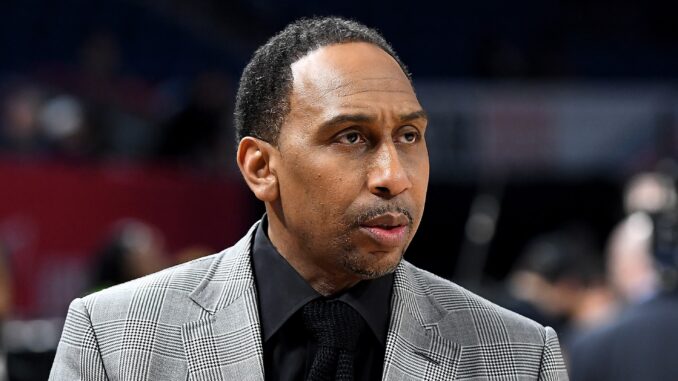
BREAKING: ESPN Permanently Bans Stephen A. Smith from NBA Coverage After Solitaire Scandal During Game 4 of the NBA Finals
In a shocking and unprecedented development in the sports media world, ESPN has permanently banned longtime analyst and commentator Stephen A. Smith from covering all NBA games following an embarrassing incident during Game 4 of the 2025 NBA Finals. According to multiple league and network sources, Smith was caught playing Solitaire on his personal laptop while seated courtside, during what was arguably one of the most pivotal games of the season.
The move, which sent ripples across the broadcasting industry and NBA fandom, is being labeled by insiders as “a breaking point” in what had been a strained relationship between Smith and ESPN’s NBA division for the past year. With the Finals stage set for an epic clash between the Denver Nuggets and Boston Celtics, many are stunned that one of the most recognized faces in sports journalism found himself so disengaged during live coverage.
The Incident That Shocked the League
Sources close to both ESPN and the NBA have confirmed that during the second quarter of Game 4—held at the TD Garden in Boston—Smith, seated courtside as part of the primary ESPN commentary team, was seen by multiple credentialed media members visibly engrossed in a game of Solitaire on his laptop. Several images and short video clips, reportedly captured by production assistants and behind-the-scenes staff, began circulating among media personnel just minutes after the incident.
Initially dismissed as speculation, the rumors gained traction when one clip showed Smith looking away from the court entirely, repeatedly clicking and dragging cards on a digital Solitaire interface while the crowd erupted in reaction to a critical three-pointer by Celtics guard Jaylen Brown.
According to one ESPN producer who spoke on the condition of anonymity, “There was no mistaking it. We saw the cards, the classic green background—he wasn’t taking notes, wasn’t checking stats, nothing. Just straight-up playing Solitaire while history was being made in front of him.”
The NBA, already known for its tight media protocols and professionalism during the Finals, reportedly reached out to ESPN executives the following morning demanding clarification.
ESPN’s Swift and Unprecedented Response
Within 24 hours, ESPN issued a formal internal memo notifying employees of Stephen A. Smith’s immediate and permanent suspension from any NBA-related coverage, including live broadcasts, commentary shows, and playoff assignments. Later that day, the network publicly confirmed the decision in a brief, tightly-worded statement:

> “Effective immediately, Stephen A. Smith will no longer be involved in NBA coverage across any ESPN platforms. We hold our team to the highest standards of professionalism, particularly during moments as significant as the NBA Finals. We thank Stephen A. for his years of service to NBA broadcasting.”
This development marks the first time ESPN has issued a lifetime ban on any of its current talent specifically for misconduct during a live event. While Smith remains employed by the network and is expected to continue contributing to programs like First Take in other sports categories, insiders suggest his role could be significantly reduced.
A Career of Fire and Fury
Stephen A. Smith, a polarizing yet undeniably iconic voice in American sports media, has built a reputation for his no-holds-barred takes, dramatic flair, and deep insider knowledge—especially within the NBA. Over the past two decades, he became a staple on ESPN’s First Take, NBA Countdown, and countless pregame and postgame shows.
Smith’s larger-than-life personality has often drawn criticism, particularly for perceived overreactions or personal attacks on players and coaches. Yet few can argue with his cultural impact; he has remained among ESPN’s highest-paid and most-watched personalities, commanding millions of views across platforms.
Still, signs of tension have reportedly been brewing for months. ESPN executives allegedly grew concerned about Smith’s “oversaturation” and occasional lapses in focus during high-stakes events. This Solitaire incident appears to have been the last straw.
Fallout in the NBA and the Sports World
The news of Smith’s ban sparked a wave of reactions across the NBA, social media, and sports media at large. Players, coaches, and even fellow commentators have weighed in, with reactions ranging from disappointment to outright mockery.
Former NBA star and current TNT analyst Charles Barkley couldn’t resist taking a jab: “Man, you can’t be playing Solitaire during the Finals. At least play Poker or something with stakes. That’s just sad.”
NBA commissioner Adam Silver, when asked to comment, stated: “While the league doesn’t govern media behavior directly, we support our partners’ decisions to uphold integrity during broadcasts. Finals games are global events. Everyone involved has a responsibility to reflect the magnitude of the moment.”
Others have expressed concern over what this incident might mean for the broader relationship between journalists and the NBA.
“There’s a growing sense among players that many media personalities aren’t really engaged anymore,” said a Western Conference All-Star who asked not to be named. “If Stephen A. can tune out during the Finals, what does that say about the rest of them?”
A Tarnished Legacy?
It’s unclear what this incident will mean for Stephen A. Smith’s long-term reputation. Though he is unlikely to leave ESPN entirely, some believe this could begin the sunset phase of his career.
Sports media expert Richard Deitsch weighed in via X (formerly Twitter), writing: “Smith has always walked a fine line between performance and professionalism. This incident might have finally tipped the balance.”
While die-hard fans have jumped to Smith’s defense—some arguing that Solitaire was a momentary lapse or that other commentators have done worse—critics have pounced on the opportunity to demand a higher standard.
“This isn’t about Solitaire,” wrote columnist Jemele Hill in a widely shared post. “It’s about accountability. If Stephen A. Smith can’t engage with the Finals, maybe it’s time for new voices who can.”
What’s Next for Stephen A. Smith?
Though banned from NBA coverage, Stephen A. Smith’s future at ESPN remains partly intact. Sources suggest he will continue to lead NFL and college sports segments in the fall and could even explore independent podcasting or digital ventures.
In a brief video statement posted on his personal social media account, Smith acknowledged the controversy without directly addressing the Solitaire claims:
> “I respect the decision made by my employers. I’ll have more to say soon, but for now, I just want to thank the fans for years of support. This isn’t the end of Stephen A., not by a long shot.”
Whether that statement will hold true remains to be seen. For now, one thing is clear: one of the loudest and most recognizable voices in basketball has gone silent—at least when it comes to the NBA.
As the league advances toward crowning its champion, the void left by Stephen A. Smith’s absence in the commentary box is already being felt—and debated—across sports culture.
And somewhere in the background, perhaps fittingly, the faint sound of digital cards being shuffled still echoes.
Leave a Reply